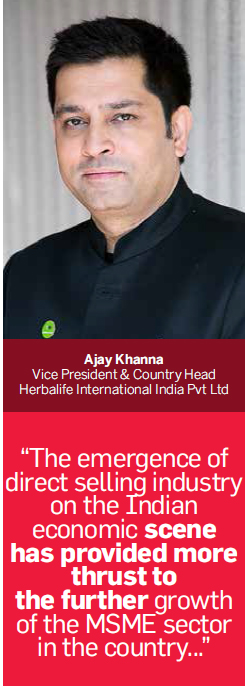DS Industry: Aligned to Vision Make in India

The Direct Selling Industry has for long been manufacturing in India, especially through its SME vendor-partners.
The call to Make in India put the focus firmly on the country’s manufacturing sector. The Union Budget 2015-16 further cemented the government’s commitment to making India the manufacturing hub of the world. Finance Minister Hon’ble Shri. Arun Jaitley announced a series of cuts in customs and excise duty in a clear bid to boost domestic manufacturing and thereby create more jobs. The Budget announcements have also brought cheer to the small and medium enterprise (SME) sector which is optimistic that the thrust on manufacturing will lead to viable gains for them. Earlier, Hon’ble Shri. Ram Vilas Paswan, Minister for Food, Public Distribution and Consumer Affairs, had emphasized the role that investment would play in Make in India. “Investment is very important to fuel out Hon’ble Prime Minister Shri. Narendra Modi’s Make in India campaign. Today, consumers do not prefer to buy the products with Made in India tag. So, we are on radar to make the tag consumer friendly and change the consumers’ perception.”
In the light of the new Budget, the contribution that the Direct Selling Industry has been making to manufacturing in India and Made in India products through the services of the SME sector is exemplary. For long, the Direct Selling Industry has been quietly playing a yeoman’s role in the generation of self-employment and the promotion of manufacturing through the engagement of SME players. Take for instance Herbalife India. The company with its registered office in Bangalore sells its products in more than 50 locations across India and manufactures its products through third party manufacturers at Baddi and Paonta Sahib in Himachal Pradesh in state-of-the-art facilities. Herbalife takes pride in the fact that in India majority of its products are manufactured through micro, small and medium enterprises (MSMEs). As says Mr. Ajay Khanna, Vice President and Country Head, Herbalife International India Pvt Ltd, “The emergence of Direct Selling Industry on the Indian economic scene has provided more thrust to the further growth of MSME sector in India. The Direct Selling Industry in the last decade has showcased a trailblazing double digit growth and this has contributed to the successful partnership between MSME and the Direct Selling Industry in India.”
Avon India opened its first manufacturing facility in Dehradun in April 2010 and has state-of-the-art Avon Beauty Zones in seven cities namely Delhi, Mumbai, Bangalore, Kolkata, Pune, Chandigarh and Chennai. Almost 97 per cent of products sold by Amway India are manufactured domestically through third-party contracts. The implications of this on job creation are immense. The company that was allowed to carry out its business in India by the FIPB so long as there was transfer of technology to small or medium scale industry finds it a win-win situation. The company feels that setting up its own manufacturing units by ending their longstanding relationship with the MSEs, which have grown over the period of their association with the company, makes little sense. However, it is currently setting up a state-of-the-art manufacturing facility in Tamil Nadu with an investment of Rs. 600 crore.
Fact is that the Direct Selling Industry and the micro, small and medium enterprises have been complementing each other’s growth in India. Growth of the Direct Selling Industry in recent years has further enhanced the level of cooperation between the various Direct Selling Companies and the micro, small and medium enterprises in India. Mr. Khanna states that “with our Hon’ble Prime Minister’s announcement on Make in India, manufacturing would get real attention and attract investment. However, to keep the positive momentum alive, regulatory restrictions need to be streamlined.” He further explains that for the Direct Selling Industry the challenges are manifold, “Direct Selling is a relatively new concept in India and a non-conventional mode of business. Absence of a specific law/guideline or regulation is the prime challenge before Direct Selling Business. Fraudulent financial companies often operate in the disguise of Direct Selling. Trade and Commerce being state subject, states have power to regulate trade and that has made the situation more complex, with certain states moving to draft legislation to regulate Direct Selling. Direct Selling Businesses related to food products need to apply and secure approval from FSSAI for all products marketed/to be marketed in India. The process is tedious and time consuming with applications pending as old as two-and-a-half years for want of approval.”
Notwithstanding these impediments that adversely affect manufacturing activity by the Industry, it has still managed to make deep impact on the manufacturing sector. The positive socio-economic fallouts of the Direct Selling Industry on the local communities are immense as it promotes self-employment and entrepreneurship among the masses. MSME and Direct Selling Industry provide hands on training to the people who get associated with the Industry. According to IDSA data, more than 1.5 million Indians are involved in the Direct Selling Industry. Undoubtedly, Direct Selling has immense potential for self-employment and creating a job pool for Indians in the country. The Direct Selling Industry has also helped SMEs in upgrading their technologies and manufacturing knowhow. As the industry relies mostly on these small scale enterprises for product manufacturing, they invest in latest technologies and impart training to SME employees to enable them to produce quality products. Being skilled, in terms of technology and manpower, these small enterprises have begun catering to the demands of other big companies globally. Dr. A Didar Singh, Secretary General, FICCI, was quoted in a media report as saying, “Majority of the Direct Selling Companies outsource production, packaging and distribution of their products, thus generating direct employment across the value chain while enabling the development of the SME sector.”

India is one of the great potential markets for the Direct Selling Industry as there is great headroom for growth. This assessment is based on the Industry’s performance in smaller countries like Mexico where it has already outstripped India by six times. Looking at these immense possibilities, Mr. Khanna exhorts industry players to take maximum advantage of Make in India initiative and persuade India specific plans both in manufacturing and CSR as Make in India is focused on increasing domestic production and export. The Direct Selling Industry which has been at the forefront of making India the manufacturing destination of the world, promises immense potential under the new mission.
The direct selling industry which has been at the forefront of making India the manufacturing destination of the world, promises immense potential under the new mission.
Copyright © IDSA 2018 All Right Reserved.
Design & Developed by : It Info Technologies Pvt. Ltd

